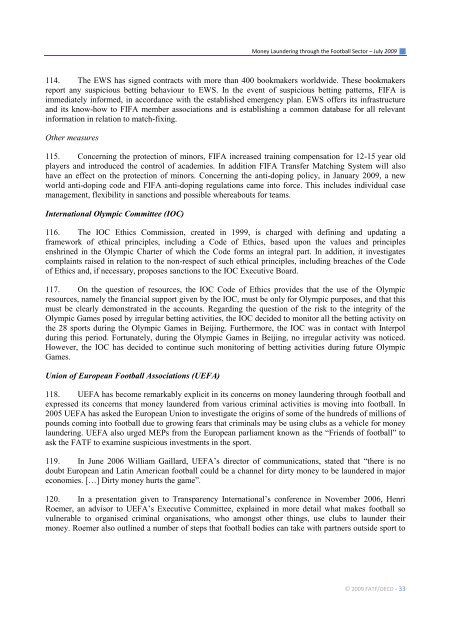Money Laundering through the Football Sector
Money Laundering through the Football Sector
Money Laundering through the Football Sector
You also want an ePaper? Increase the reach of your titles
YUMPU automatically turns print PDFs into web optimized ePapers that Google loves.
<strong>Money</strong> <strong>Laundering</strong> <strong>through</strong> <strong>the</strong> <strong>Football</strong> <strong>Sector</strong> – July 2009 <br />
114. The EWS has signed contracts with more than 400 bookmakers worldwide. These bookmakers<br />
report any suspicious betting behaviour to EWS. In <strong>the</strong> event of suspicious betting patterns, FIFA is<br />
immediately informed, in accordance with <strong>the</strong> established emergency plan. EWS offers its infrastructure<br />
and its know-how to FIFA member associations and is establishing a common database for all relevant<br />
information in relation to match-fixing.<br />
O<strong>the</strong>r measures<br />
115. Concerning <strong>the</strong> protection of minors, FIFA increased training compensation for 12-15 year old<br />
players and introduced <strong>the</strong> control of academies. In addition FIFA Transfer Matching System will also<br />
have an effect on <strong>the</strong> protection of minors. Concerning <strong>the</strong> anti-doping policy, in January 2009, a new<br />
world anti-doping code and FIFA anti-doping regulations came into force. This includes individual case<br />
management, flexibility in sanctions and possible whereabouts for teams.<br />
International Olympic Committee (IOC)<br />
116. The IOC Ethics Commission, created in 1999, is charged with defining and updating a<br />
framework of ethical principles, including a Code of Ethics, based upon <strong>the</strong> values and principles<br />
enshrined in <strong>the</strong> Olympic Charter of which <strong>the</strong> Code forms an integral part. In addition, it investigates<br />
complaints raised in relation to <strong>the</strong> non-respect of such ethical principles, including breaches of <strong>the</strong> Code<br />
of Ethics and, if necessary, proposes sanctions to <strong>the</strong> IOC Executive Board.<br />
117. On <strong>the</strong> question of resources, <strong>the</strong> IOC Code of Ethics provides that <strong>the</strong> use of <strong>the</strong> Olympic<br />
resources, namely <strong>the</strong> financial support given by <strong>the</strong> IOC, must be only for Olympic purposes, and that this<br />
must be clearly demonstrated in <strong>the</strong> accounts. Regarding <strong>the</strong> question of <strong>the</strong> risk to <strong>the</strong> integrity of <strong>the</strong><br />
Olympic Games posed by irregular betting activities, <strong>the</strong> IOC decided to monitor all <strong>the</strong> betting activity on<br />
<strong>the</strong> 28 sports during <strong>the</strong> Olympic Games in Beijing. Fur<strong>the</strong>rmore, <strong>the</strong> IOC was in contact with Interpol<br />
during this period. Fortunately, during <strong>the</strong> Olympic Games in Beijing, no irregular activity was noticed.<br />
However, <strong>the</strong> IOC has decided to continue such monitoring of betting activities during future Olympic<br />
Games.<br />
Union of European <strong>Football</strong> Associations (UEFA)<br />
118. UEFA has become remarkably explicit in its concerns on money laundering <strong>through</strong> football and<br />
expressed its concerns that money laundered from various criminal activities is moving into football. In<br />
2005 UEFA has asked <strong>the</strong> European Union to investigate <strong>the</strong> origins of some of <strong>the</strong> hundreds of millions of<br />
pounds coming into football due to growing fears that criminals may be using clubs as a vehicle for money<br />
laundering. UEFA also urged MEPs from <strong>the</strong> European parliament known as <strong>the</strong> “Friends of football” to<br />
ask <strong>the</strong> FATF to examine suspicious investments in <strong>the</strong> sport.<br />
119. In June 2006 William Gaillard, UEFA‟s director of communications, stated that “<strong>the</strong>re is no<br />
doubt European and Latin American football could be a channel for dirty money to be laundered in major<br />
economies. […] Dirty money hurts <strong>the</strong> game”.<br />
120. In a presentation given to Transparency International‟s conference in November 2006, Henri<br />
Roemer, an advisor to UEFA‟s Executive Committee, explained in more detail what makes football so<br />
vulnerable to organised criminal organisations, who amongst o<strong>the</strong>r things, use clubs to launder <strong>the</strong>ir<br />
money. Roemer also outlined a number of steps that football bodies can take with partners outside sport to<br />
© 2009 FATF/OECD - 33


